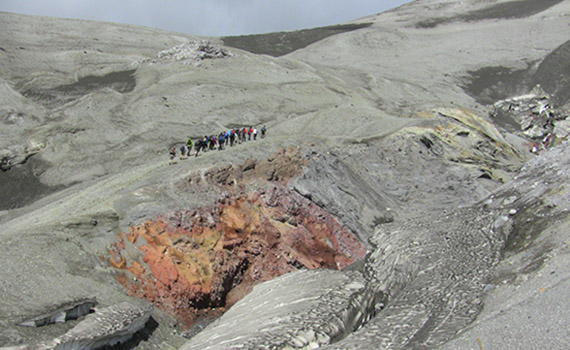The Year of 2013 offers many ways for °Ä˛ĘżŞ˝± to celebrate its lucky number (the university was founded by 13 men with 13 dollars and 13 prayers). As part of our yearlong celebration, on the 13th of every month we will post a story or list pertaining to our lucky number. First up: 13 interesting °Ä˛ĘżŞ˝± courses you may or may not know about, in alphabetical order.
1. Artificial Intelligence ()
This seminar investigates how computers can be made to behave “intelligently.” Topics include the programming language LISP, natural language processing, computer vision, search techniques, AI databases, story comprehension, medical diagnosis, and problem-solving.
2. Dispossession, dislocation, and diseases: Geographies of population vulnerability ()
Students explore geographic perspectives on population dynamics, social justice, and human rights. The aim is to understand the heightened risks of mortality and dislocation from home and homelands, dispossession from cultural and environmental resources, and risks to family welfare and formation. Includes local/international service learning component.
3. Dynamical systems and chaos ()
Complicated systems of interacting entities produce complicated behavior. Simple systems of one or two interacting entities produce simple behavior. The field of dynamical systems was born with the realization that simple systems of as few as three entities can produce incredibly complicated behavior, known as chaos.
4. Food ()
This course explores where food comes from, how it is produced, and how it is embedded in our economic, political, and cultural institutions. Students participate in a service learning internship at nearby Common Thread Community Farm. Through field trips and guest speakers students apply what they learn to local food and farming communities.
5. Living Writers ()
Students learn how serious writing is achieved by reading works by contemporary fiction writers and then meeting with them in the classroom setting. Each week the writer whose work has been under discussion visits the class. The presentation is followed by a public reading.
6. Megageology ()
This course traces the history of the Earth from the origin of the solar system to the present. Also considered are plate tectonics, continental drift, and mountain building; absolute age dating; the origin of the hydrosphere and atmosphere; earthquakes and volcanism.
 7. Molecules that rock your world ()
7. Molecules that rock your world ()
In this course students learn how elements and molecules have affected the course of civilization. Elements (like iron) and alloys (like bronze) have entire ages named after them, but how did tin change the course of history? Students take part in molecular modeling, , and lab-like exercises.
8. Outbreak! Historical pandemics and emerging infectious diseases ()
Students examine three historical epidemics: the “Black Death,” cholera in London in the 1850’s; and 1918 “Spanish flu.” More recent outbreaks, including SARS and the H1N1 influenza pandemic also are explored in the context of epidemiological principles.
9. Pirates in the Atlantic World ()
This course explores the role pirates played in the development of Atlantic empires, colonial American societies, the transatlantic slave trade, and the Atlantic commercial system from the 16th to the 18th centuries. International legal issues and gender issues also are studied.
10. Poets, Lovers, and Monsters
This course explores the significations of one culture’s changing fantasies of monsters — those from archaic, classical, and Hellenistic Greece — by looking at them in conjunction with some modern monsters. The course aims at comprehending the ancient Greek nexus of monster and artist — both figures with a marked physical or personality flaw, outsiders to heroic society. Readings include selections from Hesiod, Homer, Pindar, Sophocles, Euripides, Plato, and Theocritus. These classical texts are complemented by readings from contemporary poets, as well as viewings of several classic horror films.
11. Sex, Drugs, and Chocolate (
Starting with basic plant biology and leading to human-plant interactions, this course explores the many tasty, interesting, useful, mystical, and illegal uses of plants. Topics include the history of agriculture and its effects on land use and the environment, the origin of common crops, historical and modern human uses of plants, and the chemistry, pharmacology, and history of drug use.
12. The problem of evil ()
Why do bad things happen to good people? This course explores historical, philosophical, and religious perspectives on the etiology, manifestations, and functions of human suffering and evil within human societies. Particular attention is given to explanatory theories about the problem of evil by post-Enlightenment philosophers as well as the theological problem of evil (Why does God permit evil?).
13. Volcanology ()
Volcanoes have awesome powers of destruction; yet their constructive role in shaping our landscape, atmosphere, and oceans has been crucial in Earth’s history. This course explores the fundamental concepts of volcanology, from the geological, chemical, and physical processes that generate volcanoes to the implications of volcanic activity on humankind.
What courses do you like best?
